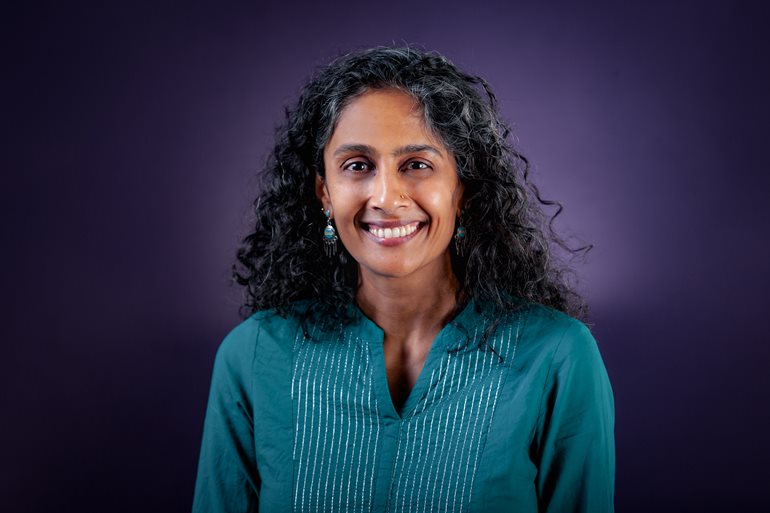For Dr. Brinda Sarathy, becoming the new dean of the School of Interdisciplinary Arts & Sciences at the University of Washington Bothell felt like a calling.

Dr. Brinda Sarathy, dean of the School of Interdisciplinary Arts & Sciences
When she saw the open position, she was struck by the school’s goal to create lasting partnerships “that are socially-just and committed to finding environmentally-sustainable options for the development of the region.”
Sarathy has dedicated most of her adult life to advocating for environmental justice. During the first year of the pandemic, she also spent time reflecting on how else she could use her intellect and skills to support others.
“I realized the next chapter should be about paying it forward,” she said. “I have benefited from public institutions in the past, and it’s my time to give back. I hope to use my resources and position as a platform to advocate for social and environmental justice.”
Where it began
Sarathy was born in Canada but spent most of her childhood in a largely American compound in Saudi Arabia, where her father was working in the oil industry. “It is kind of ironic because all of his kids went into environmental work,” Sarathy said. “I suppose we are paying it forward.”
Her personal commitment to protecting the environment began at a boarding school in South India. It was there she experienced “an environmental awakening.” Unlike the ready amenities in Saudi Arabia, Sarathy recalls how in South India water was not taken for granted.
“We were viscerally aware of the natural resources around us. If there was not enough rain, we had to cut back on the number of showers we could have,” she said. “The impact of a water shortage was something we immediately felt.”
This experience helped lay the foundation for her lifelong passion and work for the environment. It also is part of what makes her role as dean of IAS such a great fit, Sarathy said, noting that the school is keenly focused on understanding and addressing issues of justice, from the environment to the flourishing of human communities.
Long-lasting relationships
It wasn’t only the mission of justice and equity that attracted Sarathy to UW Bothell. It was also the commitment of the faculty to solving real-world problems. “It’s not just the ivory tower where professors only ponder. Here at the University, they take action to make the world a better place,” she said.
Sarathy was originally drawn to higher education because of her love for teaching and working with students. Before joining UW Bothell this summer, she was a professor of environmental analysis at Pitzer College in Claremont, Calif. There, she developed the first environmental justice course for the Claremont Colleges.
As a professor, she cared deeply about helping her students to think critically and to hold themselves accountable. “I wanted my students to be intellectually curious and, when they formed opinions, to be able to justify their positions, rather than blindly adhering to one perspective or another,” Sarathy said. “That transfers to accountability as they have to be responsible for the impact their beliefs make on society.”
Now that she is in the Seattle area, she added, she is also excited to reunite with some former students who are now working in the region. “I get so much gratification seeing my students go on to do all of these amazing things,” she said. “There is no better payoff than knowing I planted seeds in their minds and seeing those seeds bloom and continue to spread. That is what keeps me going.”
Leadership as service
As the new dean, one of the first priorities for Sarathy is getting to know the IAS faculty and the curriculum. She wants to understand how students move through their majors and what that experience is like for them and for the faculty. Then, her goal is to determine where there is energy for change and growth.
She also plans to increase the number of external members on the IAS advisory board, with the goal of raising the school’s regional profile and increasing engagement and financial support from the community.
For her, leadership is about elevating IAS students, faculty, staff and partners. “I like to shine the spotlight on everyone around me,” she said, “because when one of us succeeds, we all have a reason to celebrate.”
Tying back to her passion for helping the environment, she is currently developing a program called Scholars for Environmental Equity and Resilience which will immerse UW Bothell students more deeply in environmental justice issues.
“SEER will provide paid internships to students who are interested in a number of environmental areas such as environmental resilience, justice and sustainability,” Sarathy explained. “It will be launched later this academic year.”
Supporting students
Although not currently teaching, Sarathy plans to remain connected to students, who she considers “the lifeblood of the system.”
Recognizing the huge transition they now face as they return to in-person learning after 18 months away, she has this advice for students:
“Pace yourself. Pay attention to what is going on inside and, if you need help, ask for it. We continue to be in a time of uncertainty, give yourself grace and flexibility. Cultivate some form of spiritual practice to give you strength and resilience that will carry you in the long run.
“Take care of yourself,” she said, “so we can take on the world.”



